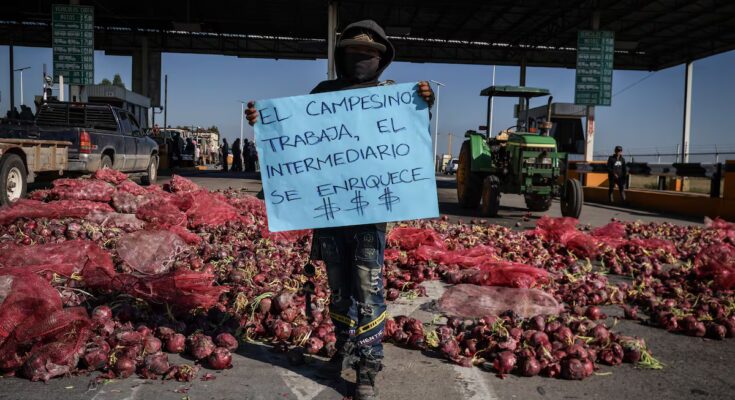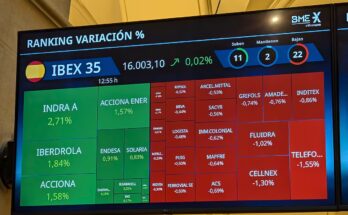The Mexican Congress is pressing the accelerator to approve new legislation on water in the country by December 15th. Promoted by President Claudia Sheinbaum, this proposal has created a new point of conflict between agricultural and livestock organizations and the government, following the dispute over the price of a ton of corn in October. This disagreement between the parties led farmers to block the wagons for two days in at least 20 states of the Republic. Rural organizations agreed this Sunday to close roads, businesses and border crossings if Morena and his allies insist on speeding up the legislative process.
The crux of the conflict lies in the fact that concessions for the use of water can no longer be transferred between private individuals, having to return them to the State so that the National Water Commission (CONAGUA) can reassign them. The justification for this ban is to put an end to the illegal market in water concessions that has been created in the country. According to farmers interviewed, this will make it impossible for them to inherit or sell their lands, since without permission to use the water they have no value.
“It is a regressive law that deprives us of the rights acquired by farmers with water concessions; it puts at risk the stability of our families, our investments and the economic growth of the countryside”, denounces Eraclio Rodríguez, former federal deputy of the PT and farmer from Chihuahua. According to Rodríguez and his colleagues at the National Front for the Rescue of the Countryside, an organization present in 25 states, their lands are worthless without water concessions.
In the 1990s, during the six-year term of Carlos Salinas de Gortari, the National Water Law was promulgated, which allows the passage of rights between private entities without having to go through the public Administration. This has led to Conagua currently having no control or tracking of how much water users use or for what purposes. Because the licensed extraction volume is excessive, Conagua cannot grant more permits and individuals are forced to carry out illegal sales operations. With this new law, an unused concession returns to Conagua to be reassigned.
The water millionairesAn academic work that analyzed water concessions in Mexico observed that there are approximately 3,300 large private users to whom Conagua has donated a volume of one million cubic meters or more per year. In total, equal to 1.1% of the total, they have 13,000 million cubic meters per year, 22% of all the water granted in the entire country. To give you an idea, the volume of an Olympic swimming pool is 2,500 cubic meters.
This new regulation consists of an initiative to develop a new general water law and a draft decree reforming the national water law. In 2012, the Constitution gave constitutional status to the human right to water and allowed one year to enact a general water law. Although there were attempts during the six-year terms of Enrique Peña Nieto and Andrés Manuel López Obrador, they were unsuccessful. This new legislation aims, according to its motivation, to guarantee access to water as a guaranteed right and favors, in times of scarcity, domestic and public use over industrial or agricultural use.
“The ban on the transfer of concessions is a positive aspect, since with the current law an illegal market has been created in which concessions are the domain of people, who come to have an ownership title, and then can transfer them, transfer them, mortgage them or speculate with them, as if they were a commodity, not a permit or a concession,” explains Beatriz Olivera, master’s degree in industrial engineering and member of the Cambiémosla Ya collective, which seeks to radically reform the mining law. Olivera believes that the specific case of farmers and small landowners needs to be reviewed, but he understands the logic behind eliminating this possibility.
Another point of conflict for peasant organizations is that the new legislation conditions the volumes assigned to have an infrastructure that meets the conditions of sustainability and water saving. This represents a significant expense for small and medium-sized producers, who lack the necessary resources, and puts them at a disadvantage compared to large agri-food companies.
“We still have dirty canals, we don’t have irrigation or drip systems, we don’t have the resources like the foreign companies that are in the state have,” complains Horacio Gómez, president of the Baja California Grain Producers Association.
Farmer leaders met to negotiate with the Interior Ministry, without reaching an agreement. The Sheinbaum administration has offered that their requests remain in a transitional article, that is, in a temporary rule that can later be easily repealed.
The farmers’ representatives are seeking a direct dialogue table with President Sheinbaum, as they believe that the Minister of the Interior, Rosa Icela Rodríguez, and the Minister of Agriculture, Julio Berdegué, are not faithfully transmitting their requests. “We want him to be present and confirm that he has the information, that he is aware of our concerns and our solutions,” Gómez says.
The Peasant Front met this weekend in Mexico City to discuss the actions that will follow if approval advances in the Legislature. For now they have agreed to a meeting this Monday in the Chamber of Deputies with Morena’s deputies. The intention is to convince them to pass the anti-clock ordinance. The symbolic takeover of the Ministry of Agriculture and Rural Development and a press conference in front of the National Palace to announce more radical actions are being prepared for Tuesday. A national strike which involves the closure of roads, commercial activities and the seizure of border crossings. This pressure measure worked days ago in the corn conflict, forcing the government to grant an increase in the price to be paid per ton.


